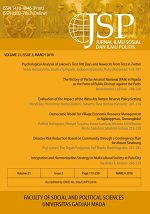Potential Conflict Among ASEAN Member States in The Implementation of The ASEAN Economic Community
https://doi.org/10.22146/jsp.27208
Sugiarto Pramono
(1*) , Anna Yulia Hartati
(2) , Adi Joko Purwanto
(3)
(1) Department of International Relations, Faculty of Social and Political Sciences, Wahid Hasyim University, Semarang.
(2) Department of International Relations, Faculty of Social and Political Sciences, Wahid Hasyim University, Semarang.
(3) Department of International Relations, Faculty of Social and Political Sciences, Wahid Hasyim University, Semarang.
(*) Corresponding Author
Abstract
The findings in this article defy the common assumption that the free market, including the formation of the ASEAN Economic Community (AEC) in Southeast Asia, is correlated with the creation of a spillover and complex interdependency, reducing conflicts between countries in the region. This finding could well contribute as a theory in the academic sphere and as policies in the practical world. The author uses a theoretical framework of structural realism to explain the potential conflict between countries of the Southeast Asian region. There are four potential conflict situations among countries in the implementation of AEC: firstly, the structure of economic disparity. This situation would construct an identity of in-group – out-group or “us” versus “them” in the context of who gains and loses in the AEC. Secondly, similarity of natural resources. This fact led the Southeast Asian countries to compete and create standardization wherein each party is in hostile competition to claim valid findings and arguments associated with efforts to reduce or stop the flow of imports into their respective countries. Thirdly, competition among businesses, in which AEC constructed free market could potentially provoke the emergence of regional trading cartel. Fourthly, the structure of military power. Historical records show that any economic growth occurring in a country will be accompanied by the growth of its military budget.
Keywords
potential conflict between countries; the ASEAN Economic Community; structural realism.
DOI:
https://doi.org/10.22146/jsp.27208
Article Metrics
Abstract views : 3594
|
views : 3347
Refbacks
There are currently no refbacks.
Copyright (c) 2017 JSP (Jurnal Ilmu Sosial dan Ilmu Politik)
This work is licensed under a
Creative Commons Attribution-NonCommercial-NoDerivatives 4.0 International License .
<div class="statcounter"><a title="Web Analytics" href="http://statcounter.com/" target="_blank"><img class="statcounter" src="//c.statcounter.com/10932543/0/2e122c85/0/" alt="Web Analytics"></a></div> Statcounter <div class="statcounter"><a title="Web Analytics Made Easy - StatCounter" href="http://statcounter.com/" target="_blank"><img class="statcounter" src="//c.statcounter.com/10932543/0/2e122c85/0/" alt="Web Analytics Made Easy - StatCounter"></a></div> View My Stats























